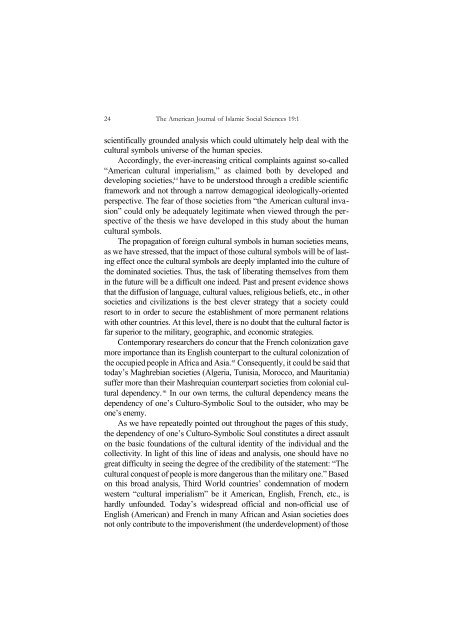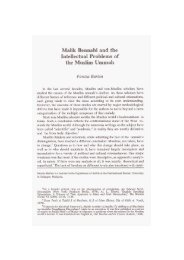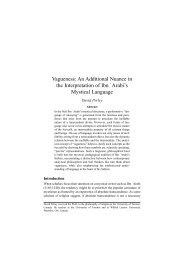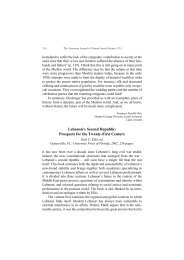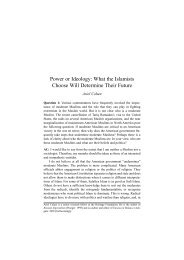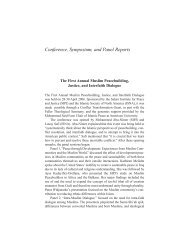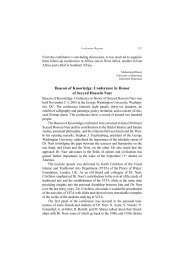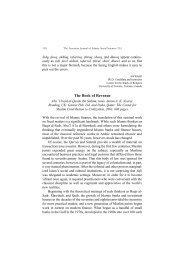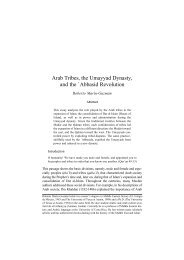Social Science's Need for a Cultural Symbols ... - Epistemology
Social Science's Need for a Cultural Symbols ... - Epistemology
Social Science's Need for a Cultural Symbols ... - Epistemology
Create successful ePaper yourself
Turn your PDF publications into a flip-book with our unique Google optimized e-Paper software.
24 The American Journal of Islamic <strong>Social</strong> Sciences 19:1<br />
scientifically grounded analysis which could ultimately help deal with the<br />
cultural symbols universe of the human species.<br />
Accordingly, the ever-increasing critical complaints against so-called<br />
“American cultural imperialism,” as claimed both by developed and<br />
developing societies, 44 have to be understood through a credible scientific<br />
framework and not through a narrow demagogical ideologically-oriented<br />
perspective. The fear of those societies from “the American cultural invasion”<br />
could only be adequately legitimate when viewed through the perspective<br />
of the thesis we have developed in this study about the human<br />
cultural symbols.<br />
The propagation of <strong>for</strong>eign cultural symbols in human societies means,<br />
as we have stressed, that the impact of those cultural symbols will be of lasting<br />
effect once the cultural symbols are deeply implanted into the culture of<br />
the dominated societies. Thus, the task of liberating themselves from them<br />
in the future will be a difficult one indeed. Past and present evidence shows<br />
that the diffusion of language, cultural values, religious beliefs, etc., in other<br />
societies and civilizations is the best clever strategy that a society could<br />
resort to in order to secure the establishment of more permanent relations<br />
with other countries. At this level, there is no doubt that the cultural factor is<br />
far superior to the military, geographic, and economic strategies.<br />
Contemporary researchers do concur that the French colonization gave<br />
more importance than its English counterpart to the cultural colonization of<br />
the occupied people in Africa and Asia. 45 Consequently, it could be said that<br />
today’s Maghrebian societies (Algeria, Tunisia, Morocco, and Mauritania)<br />
suffer more than their Mashrequian counterpart societies from colonial cultural<br />
dependency. 46 In our own terms, the cultural dependency means the<br />
dependency of one’s Culturo-Symbolic Soul to the outsider, who may be<br />
one’s enemy.<br />
As we have repeatedly pointed out throughout the pages of this study,<br />
the dependency of one’s Culturo-Symbolic Soul constitutes a direct assault<br />
on the basic foundations of the cultural identity of the individual and the<br />
collectivity. In light of this line of ideas and analysis, one should have no<br />
great difficulty in seeing the degree of the credibility of the statement: “The<br />
cultural conquest of people is more dangerous than the military one.” Based<br />
on this broad analysis, Third World countries’ condemnation of modern<br />
western “cultural imperialism” be it American, English, French, etc., is<br />
hardly unfounded. Today’s widespread official and non-official use of<br />
English (American) and French in many African and Asian societies does<br />
not only contribute to the impoverishment (the underdevelopment) of those


